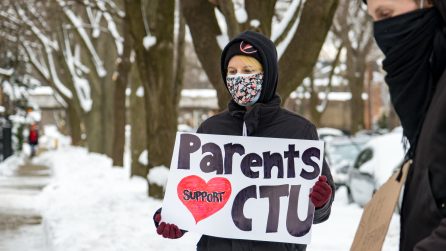The following op-ed expresses solely the opinion of its authors and does not reflect the views of Midwest Socialist or any affiliated DSA chapters.
On February 19, Bernie Sanders announced his bid for the presidency. Sanders’s 2016 campaign is central to the explosion of DSA membership across the country; his 2020 campaign could produce such an explosion again.
Today, the question of whether Chicago DSA should endorse Bernie is before us. We’re both union organizers in Chicago, and we believe that CDSA should endorse Bernie’s campaign for the presidency. Sanders has expanded what’s politically possible in this country and raised the level of class struggle in this country. The possibility of winning a better world is closer than it’s ever been in our lifetimes—if we seize it by voting to endorse Sanders.
THE SANDERS MODEL
Most socialists have a good understanding of how Sanders operates, but it’s worth going over briefly, because of how different it is from politics as usual in America.
First, Bernie speaks to real problems facing real people and talks explicitly about the villains responsible for those problems. The Sanders campaign has repeatedly distinguished itself from other progressive campaigns by directly calling out the institutions and actors that seek to exploit working-class people. By attacking the 1 percent, the corporations not paying their taxes, the vampirical private health insurance companies, and the politicians who are bought off by the wealthy, Sanders names what most working people know to be true: the corruption in D.C. undermines democracy and the lives of working people.
Sanders then puts forward bold policies for how to take those villains on. Since Sanders lost the primary in 2016, he has been fighting for policies like Medicare for All, college for all, and a Green New Deal that cut corporate profit-making out of the equation and give average people a say over their own future.
And Sanders doesn’t just believe in his power to institute these policies from on high. His video announcing his 2020 candidacy begins with the phrase, “Change comes from the bottom up.” Sanders says repeatedly that we need to lead millions of people to join a grassroots movement across the country to fight for policies like Medicare for All. He believes, like all socialists do, that working-class people are the ones who have to make history, not just politicians like him.
By naming and shaming the ultra-wealthy, then insisting that only a mass movement can defeat them, Sanders is heightening the level of class struggle in American society. As socialists who believe that class struggle is central to social change, nothing could be more exciting than this. And we’ve seen firsthand just how this is possible.
BERNIE AND RISING CLASS STRUGGLE IN THE MIDWEST
Bernie’s candidacy isn’t just about getting involved in an election, it’s about getting involved in the immediate struggles of the working class. Before Bernie announced his 2020 run Abby was meeting with non-union nurses about why they want a union. A young nurse spoke up: he wanted a union because he sees every day how his hospital is making a profit by putting patients at risk and putting nurses last. He saw the only way to stop that was to get a union and to demand a better hospital for nurses and for patients. When asked how he had first been inspired to fight, he answered, “Bernie was the one who got me thinking about it.”
Similarly, in 2015, Abby was organizing in Grand Rapids, Michigan, with a local union of bus operators and mechanics. At a time of rapid gentrification and the destruction of workers’ rights in the state, those union members’ livelihoods were being held hostage by the city’s Democrats, who were attempting to slash workers’ pensions.
The night before their contract expired, hundreds of transit workers and community supporters filled a public meeting with their Board of Directors to demand a stable retirement. Instead of voting to save the workers’ pensions, the Board of Directors actually raised the CEO’s salary to above $200,000 and raised the bus fares.
The next week, the Grand Rapids Press, the local paper, published a full-page op-ed. Its author: Bernie.
In the middle of his presidential campaign, he called out Grand Rapids’s Democratic leadership for attacking their workers. Titled “A Letter from Bernie Sanders About the Struggle Against Income Inequality in Grand Rapids,” he wrote in the op-ed, “You are taking from the working people of Grand Rapids to give more to the wealthy.”
The transit workers were ecstatic that a presidential candidate was supporting them—especially since they were receiving so little support locally. This helped produce a new militancy among the workers.
After Bernie’s op-ed, they attended multiple city council meetings to demand a dignified retirement and even held early morning protests at politicans’ homes to highlight that the futures of working class people were being destroyed. They were met with vitriol from local politicians: at one city council meeting ex-Mayor George Heartwell scolded Trula Schutt, a 70-year-old bus operator, for speaking about her pension during public comment. But the transit workers wouldn’t stop. And Sanders helped inspire them to carry on.
Bernie won Grand Rapids by a landslide as well as Michigan by speaking to the working people disenfranchised by the Democratic Party. He filled high school gyms and union halls with people who wanted more. When he came to Grand Rapids, he actually asked an ATU Local 836 member to open for him. He didn’t seek out a local politician—he wanted a rank-and-file worker. In her speech, Trula said, “We need politicians like Bernie Sanders who will stand up for working people, not like the politician who scolded me for speaking out.”
These examples show how Bernie’s campaign isn’t dampening class struggle, it’s actually heightening it and expanding it beyond the electoral realm into workplaces. And it’s doing this on a mass scale. Regular people are starting to demand more in their politics, in their work, and in their personal lives.
We have seen a teachers’ strike wave spread throughout the country over the last few years—organized in some states, like West Virginia and Arizona, by educators who first came together around the Bernie campaign. Sanders’s class-struggle message helped give workers the confidence to take militant action, and his campaign actually brought those militant workers together to organize strikes.
Because Bernie ran for president and has continued campaigning since then, the entire political landscape has changed over the last few years. With DSA involved, his 2020 campaign could do even more.
What it would mean for Chicago DSA to run an independent Bernie campaign?
As we approach 2020, a mass movement against economic inequality is again going to come together around Bernie Sanders, with or without DSA. But it would be better—both for us and for him—with DSA.
We don’t want socialists to fold completely into Bernie’s campaign. We should have our own independent campaign. This would give us an opportunity to weave our local struggles in Chicago into Bernie’s and DSA’s national platform and message. Endorsing Bernie would not mean abandoning all the other work we are invested in as a chapter. Rather, we would have new opportunities to lift up our campaign work.
For instance, though they aren’t typically tied together, the fight for housing justice has deep connections to environmental justice. We know that environmentally safe, quality, and affordable housing controlled democratically by the people should be a major part of a Green New Deal. Bernie’s campaign would give us a mass platform to organize for social housing.
To do all this, though, we have to start planning now. And to start planning, we need a chapter-wide commitment to Bernie’s candidacy.
Our forthcoming general meeting offers us a chance to do just that. To spread class struggle, grow DSA, and remake our world into one for the many and not the few, vote yes to endorse Bernie Sanders’s campaign for president at our Chicago DSA general meeting.




